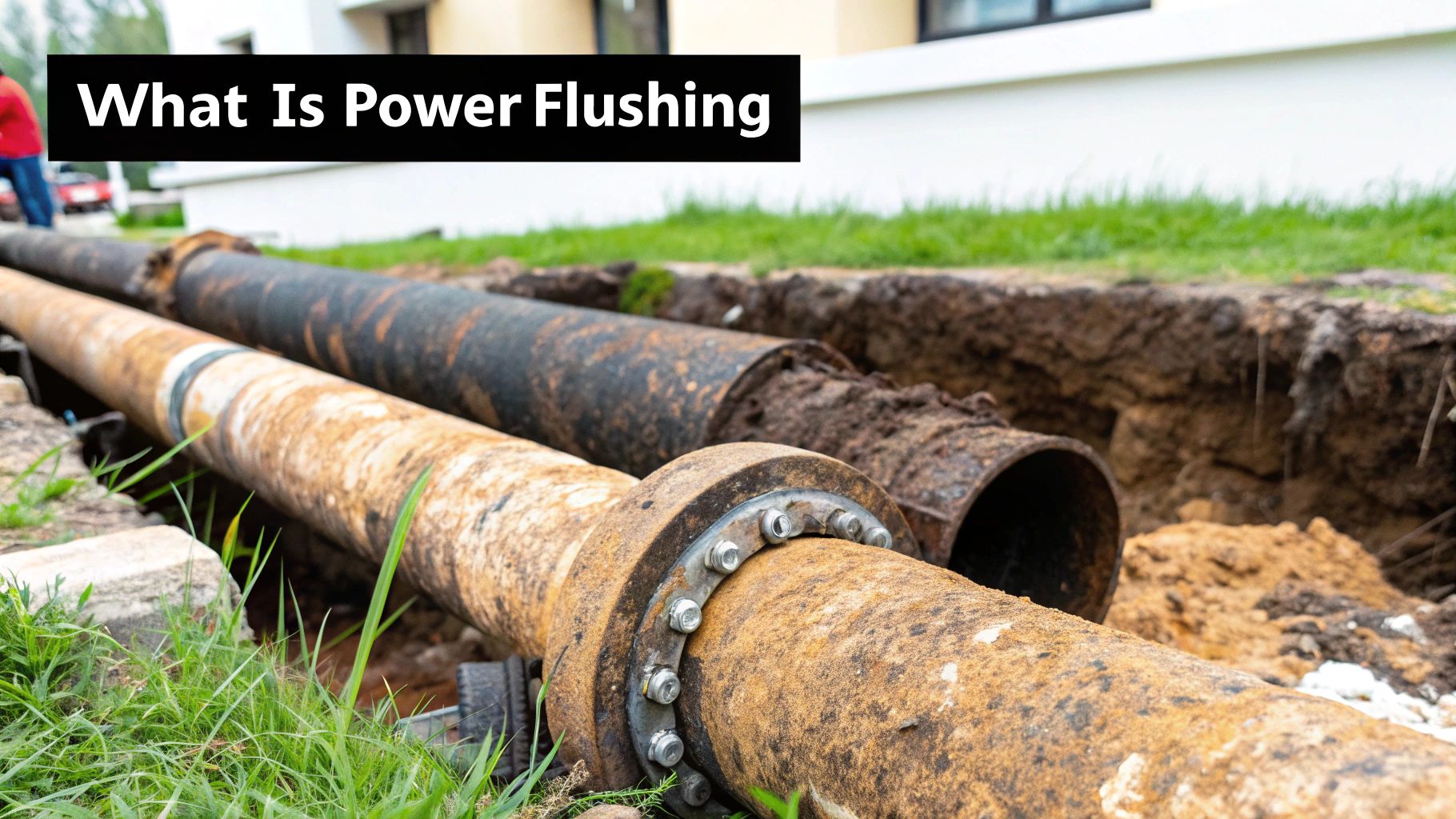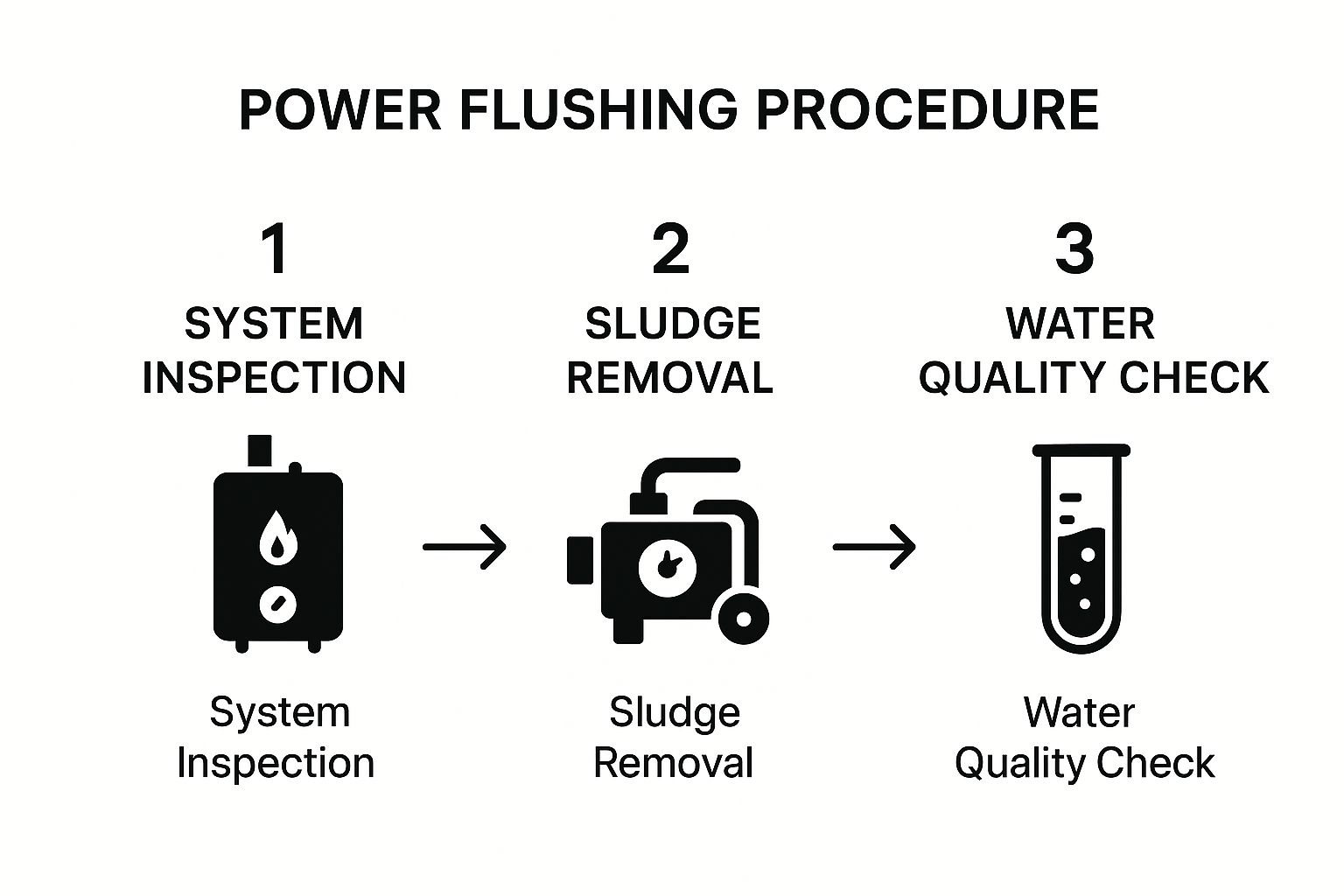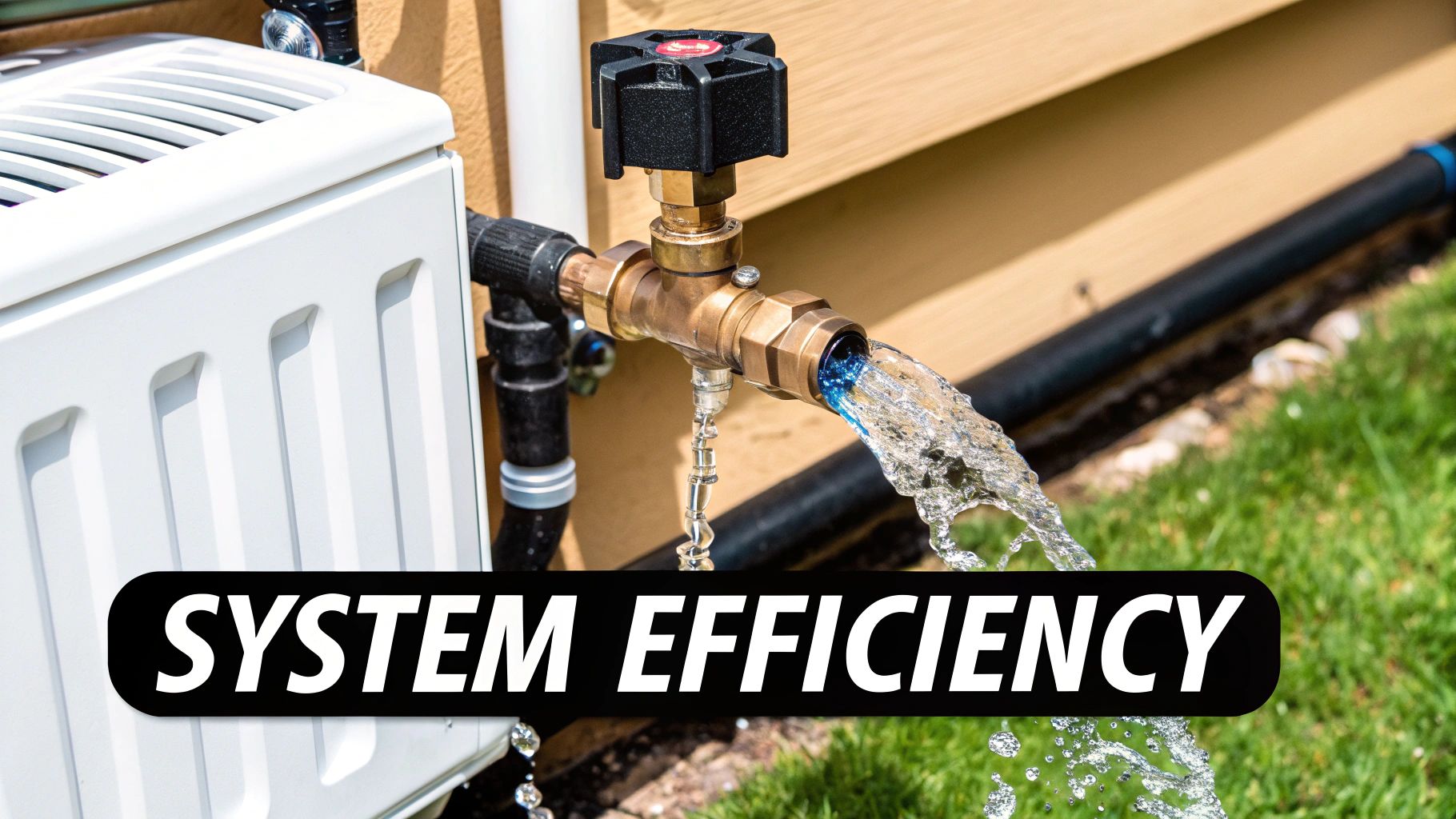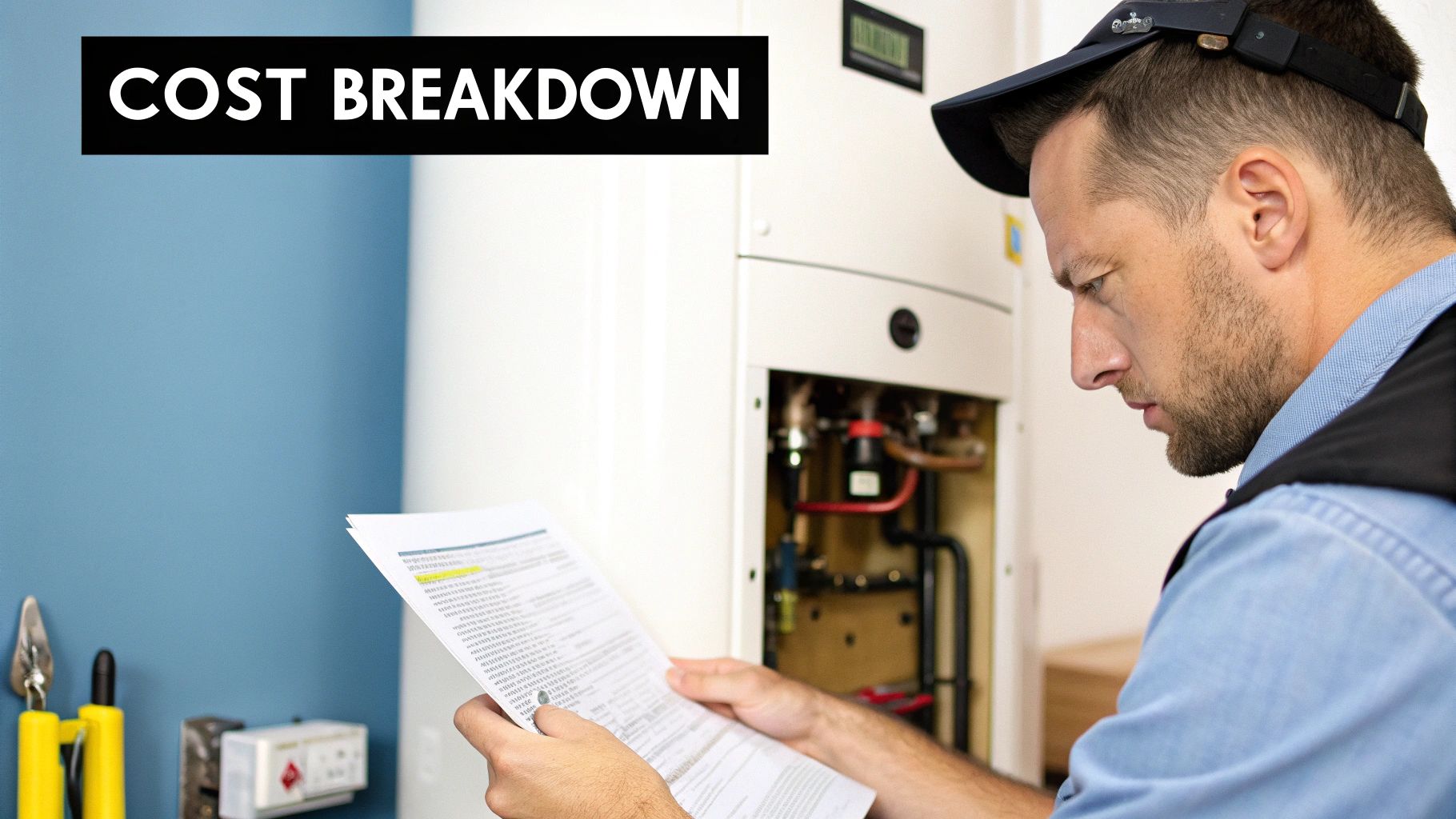What Is Power Flushing Your Heating System?
- Luke Yeates
- Sep 10, 2025
- 10 min read
If you’ve ever wondered what a power flush is, think of it as a deep-cleanse for your central heating system. It’s a powerful process that sends a high-velocity jet of water and cleaning chemicals through your pipes and radiators, blasting away all the sludge, rust, and other gunk that’s built up over the years. This isn't just a quick rinse; it restores proper circulation, improves heating efficiency, and can significantly lower your energy bills.
Understanding the Central Heating Deep Clean

Imagine your central heating system as the arteries of your home, pumping hot water around to keep everything warm and cosy. Over time, a nasty mix of rust, limescale, and other debris can build up, forming a thick, gooey substance we call "sludge."
This sludge is the enemy of an efficient heating system. It’s like cholesterol clogging your arteries—it restricts the flow of hot water, forcing your boiler to work much harder just to heat your home. For homeowners in Eastbourne, this often leads to some all-too-familiar problems. You might notice radiators that are cold at the bottom or some rooms in your house, perhaps in an older property in Meads or a newer build in Sovereign Harbour, that just never seem to get warm.
Why Sludge is Such a Problem
When your system gets clogged up, the consequences go far beyond a few cold spots. The constant strain on your boiler can cause it to make strange banging or kettling noises, lead to faster wear and tear on important components, and even result in a premature breakdown. All that inefficiency also hits you right in the wallet, showing up as higher energy bills month after month.
A professional power flush is the single most effective way to completely clear out this internal sludge and get your heating system running like new again. It’s a total detox that removes the blockages, allowing hot water to flow freely where it’s needed.
To really see the difference, here’s a quick comparison of what you might be experiencing now versus what you can expect after a thorough clean from a local team like Harrlie Plumbing and Heating.
Heating Problems Before and After a Power Flush
Symptom in a Sludged System | Result After a Power Flush |
|---|---|
Radiators have cold spots (especially at the bottom) | Radiators heat up quickly and evenly all over |
Some rooms are consistently colder than others | Consistent, balanced heat distribution in every room |
The boiler makes loud banging or "kettling" noises | The boiler runs quietly and much more efficiently |
Heating system takes a long time to warm up | The house heats up much faster from a cold start |
High energy bills for poor heating performance | Lower energy bills due to improved efficiency |
The improvements are often noticeable straight away, making it a worthwhile investment for any struggling heating system.
How a Power Flush Revitalises Your System
During the process, a qualified engineer—like one of our team here at Harrlie Plumbing and Heating—will connect a specialised high-velocity pump to your central heating. This powerful machine pumps water and carefully selected cleaning agents through every single pipe and radiator, dislodging and flushing out years of accumulated grime.
This thorough cleaning revitalises the entire system from the inside out, protecting your boiler and ensuring you get consistent, reliable heat. While this process is a game-changer for traditional gas central heating, the principle of keeping pipework clear is vital for all heating types. You can find out more about other systems in our guide on how LPG heating works.
How The Power Flushing Process Works
So, what actually happens during a power flush? Think of it less like a simple drain and more like a high-powered, deep-cleaning facial for your entire heating system. It’s a methodical process designed to systematically blast away years of accumulated sludge.
When a qualified engineer from Harrlie Plumbing and Heating arrives at your Eastbourne home, the first thing they'll do is connect a specialised, high-velocity pumping unit directly to your central heating circuit. This is usually done where your central heating pump or a radiator was, giving them direct access to the system's arteries.
The engineer then works meticulously, isolating each radiator one by one. This clever step allows them to direct the full force of the flushing machine through a single radiator at a time, making sure even the most stubborn, hardened deposits are dislodged and forced out.
The Stages Of A Professional Flush
The entire procedure is designed to be incredibly thorough, leaving no pipe or radiator untouched. A powerful magnetic filter is also attached to the power flushing machine during the process. This is crucial for capturing all the metallic debris (mostly rust) that makes up the bulk of the sludge, preventing it from circulating back into your boiler where it could cause serious damage.
To give you a clearer picture, this image breaks down the key stages of the process from start to finish.

As you can see, a professional will first inspect the system, then get to work on the sludge removal, and finally test the water to confirm the system is sparkling clean inside.
For many older properties in Eastbourne with really hardened deposits, a standard flush might not be enough to shift the really stubborn stuff. This is where an advanced technique called Powder Flushing comes in. This method introduces a safe, fine abrasive into the water flow, which literally scrubs the inside of your pipes and radiators clean from the inside out.
This methodical, step-by-step process ensures every part of your system is thoroughly cleared out. Afterwards, fresh, clean water is added along with a special chemical called a corrosion inhibitor, which protects your system from future sludge buildup.
Developed right here in the UK, power flushing uses high-velocity water combined with specialist cleaning chemicals to dislodge sludge. While it’s highly effective, it can sometimes struggle with the hardened flakes found in older systems. To solve this, abrasive techniques like Powder Flushing were introduced to physically scrub the pipework internally before the abrasive is safely dissolved and flushed away. To learn more about how this technology came about, you can explore the evolution of central heating cleaning methods for a bit of background.
Warning Signs Your Heating System Needs Help

Is your heating system trying to tell you something? A clogged system rarely fails out of the blue. Instead, it sends out little warnings that sludge is building up inside. Learning to spot these signals means you can tackle a small problem before it snowballs into a costly boiler breakdown.
If you’ve noticed radiators in your Eastbourne home are cold at the bottom or have stubborn cold patches right in the middle, that's a classic symptom of poor circulation. Maybe the bedrooms in your Old Town house never seem to get quite as warm as the lounge, no matter how high you crank the thermostat.
These issues point directly to internal blockages that are choking the flow of hot water. At Harrlie Plumbing and Heating, we see these exact symptoms across Eastbourne, from Willingdon to Langney, every single winter.
Common Symptoms of a Clogged System
It’s not just about cold spots on your radiators. Your heating system has other ways of crying for help. Keep an eye (and an ear) out for these tell-tale signs:
Loud Noises: Have your boiler or pipes started making strange gurgling, banging, or "kettling" sounds? That’s often the noise of water struggling to force its way through constricted areas.
Dirty Radiator Water: When you bleed a radiator, the water that trickles out should be clear. If it’s black, brown, or sludgy, that’s a dead giveaway that rust and debris are circulating through your system.
Slow Heat-Up Times: Does your home take much longer to warm up than it used to? That inefficiency is a direct result of your boiler working overtime to push heat through a blocked-up system.
Frequent Boiler Lockouts: If your boiler keeps shutting down unexpectedly, it could be overheating or struggling with pressure issues caused by blockages. This can sometimes be linked to other issues, and you can learn more by checking out our guide on what causes low water pressure in UK homes.
Ignoring these warnings is a bit like ignoring the engine light in your car. A professional power flush is the most effective way to clear out that internal sludge and get your heating system back to peak health before a minor annoyance turns into a major emergency.
The Real Benefits of a Clean Heating System
Investing in a power flush brings a lot more to the table than just warmer radiators. The biggest win? A serious boost in your system's energy efficiency. When hot water can zip around your pipes and radiators without having to push through thick, gooey sludge, your boiler simply doesn't have to work as hard to warm up your home.
That difference translates directly into lower heating bills—something every Eastbourne household can appreciate. A clean system also helps extend the life of your boiler and all its moving parts, like the circulation pump. This helps you avoid those nasty, expensive surprises that always seem to happen at the worst possible time.
Maximising Efficiency and Lifespan
Think of a power flush less as a quick fix and more as a long-term investment in your home's heating health. It's all about making sure your system runs as smoothly and cost-effectively as it possibly can.
Lower Energy Bills: An efficient system burns less fuel to get your home to a comfortable temperature, which means more money stays in your pocket each month.
Increased Boiler Lifespan: By getting rid of the internal gunk that puts a strain on your system, a power flush reduces the wear and tear on key components, helping your boiler last years longer.
Improved Reliability: A clean system is a reliable one. You’ll see fewer unexpected breakdowns and reduce the risk of needing costly fixes, like dealing with a leaky radiator. You can learn more about what to expect with our guide to [radiator leak repair](https://www.harrlieplumbing.co.uk/post/radiator-leak-repair-cost-uk-guide) costs.
For the vast majority of UK homes that rely on gas central heating, keeping the system efficient isn’t just about saving money—it's also a great way to lower your carbon footprint.
With central heating in roughly 95% of UK dwellings, keeping these systems in good shape is absolutely vital. A power flush is one of the most effective ways to maintain that efficiency, clearing out the very blockages that kill heat output and drive up energy use. Here at Harrlie Plumbing and Heating, we see it every day—this service genuinely helps homeowners in Eastbourne get the most comfort from their heating while cutting down on waste.
Understanding Power Flushing Costs in Eastbourne

So, let's talk about the investment. When it comes to power flushing, there's no single price tag that fits every home. The final cost really depends on a few key factors, with the biggest one being the size and complexity of your central heating system.
It's just common sense, really. A two-bedroom flat in Sovereign Harbour with six radiators is going to be a quicker job than a large, detached house in the Meads with fifteen radiators spread across a couple of floors. The state of the system matters a lot, too. If it's heavily clogged with years of stubborn sludge, the process will naturally take longer and require a bit more elbow grease from our engineers.
Factors That Determine Your Quote
At Harrlie Plumbing and Heating, we believe in being upfront and clear. That’s why we provide transparent, fixed-price quotes for all our Eastbourne customers, so you know exactly what you’re paying for before we even start. The key things we look at are:
Number of Radiators: The more radiators you have, the more time and work it takes to flush each one properly.
System Age: Older systems often contain hardened deposits that are tougher to shift and demand extra attention.
Existing Condition: The amount of sludge buildup has a direct impact on how long the job will take.
Across the UK, the average cost for a typical home with around six radiators is in the ballpark of £400. Smaller properties might cost a little less, while larger ones will be more. You can get a better sense of how these figures break down by looking into UK power flush pricing in more detail. Think of it as a crucial investment in your home's long-term health.
We often recommend installing a magnetic system filter at the same time as the power flush. While it adds to the initial cost, it’s a smart move that continuously captures debris, protecting your system for years to come.
This combined approach is a wise upfront investment that can save you from a much bigger boiler replacement bill down the line. It's all about securing your system's long-term health and efficiency.
Got Questions About Power Flushing?
We get it. Committing to a power flush for your central heating is a big step, and you naturally want to have all the facts straight before you book. It’s one of the most common maintenance jobs we handle for homeowners across Eastbourne, so we've heard just about every question there is.
Let's clear up some of the most frequent concerns we hear at Harrlie Plumbing and Heating.
Will It Make a Mess?
One of the first things people worry about is the potential for mess. After all, we’re talking about flushing sludge and dirty water out of your pipes. But when you have a professional team on the job, a power flush is a surprisingly clean and contained process.
Our engineers are meticulous about protecting your home. We lay down heavy-duty dust sheets and use specialised equipment designed to catch every last drop of water and debris. The goal is to leave your home exactly as we found it—just with a much happier heating system.
Could It Damage My Pipes?
This is another big one, especially for those living in Eastbourne's charming older properties. You might be wondering if the pressure could be too much for a more fragile, ageing system.
An experienced and qualified engineer will always carry out a thorough assessment of your system's health before beginning any work. This initial check is crucial for identifying any potential risks.
If we spot any red flags, like severe corrosion or weak spots that could spring a leak, we stop right there. The Harrlie Plumbing and Heating team will walk you through what we’ve found and recommend the best way forward, which might mean a few small repairs are needed first. Your system’s safety is always our number one priority.
How Often Should I Get a Power Flush?
Finally, people want to know how often this is really necessary. For most central heating systems, a professional power flush every 5 to 10 years is a good rule of thumb. But this isn't set in stone.
The perfect timing really depends on a few things:
Your system's age: Older radiators and boilers tend to build up sludge a lot faster.
The water in our area: Eastbourne has hard water, which can speed up the formation of limescale and other deposits.
Its maintenance history: A well-looked-after system can go much longer between flushes.
Want to stretch that timeframe out even further? A magnetic system filter is a fantastic investment. It works around the clock, catching metallic debris before it can turn into sludge, giving your boiler and radiators long-term protection.
If your heating is playing up or you just want to get it back to peak performance, the team at Harrlie Plumbing and Heating is ready to help. Contact us today for a free, no-obligation quote and let our experts bring the warmth and efficiency back to your home.

Comments